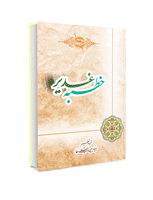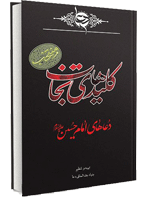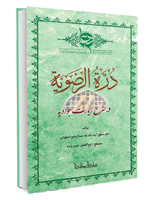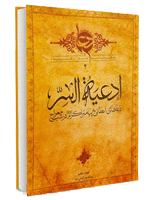- Prophet Muhammad (P.B.U.H): Whenever one of you is needy and brings that to other people, he will not be satisfied. and Whenever someone is needy and brings that to Lord, he shall give him what he wants. sooner or later.
- Imam Sadiq (As.): Whenever you had tenderness in your heart, Pray. because your heart doesn't get tender unless it's pure.
- I told to Imam Baqir (A.S): “What is the meaning of “truly, Ibrahim was awwah and patient”? He replied: “Awwah means (the one who is) praying (to) and wailing (for God) a lot.””
- “Two people, who have acted alike, enter the heaven, but one of them sees the other one in a higher place. Then, he says: O’ Lord! How come has he a superior place in comparison to me while we acted alike? God the Almighty replies: “because he asked Me (whatever he needed) and you did not do that”.
- “The most knowledgeable person to God is the one who asks more from Him”
- “Whoever prays a lot, the angels say: this voice is familiar (to us) and this is the prayer which is accepted and this is the need which is provided”
- “There is no servant who goes to a land and opens their hands and praises God and prays, unless God fills the land with his rewards, whether it is vast or tiny”
- If you knew god the way you should’ve known, Mountains definitely will be moved by your prayers.
- Crying out of fear of god is the key to his mercy, it’s a sign for his acceptance and it’s a door to answering (your prayers)
- Pray to god and believe in his answeres. But understand that god wont accept prays from an unwitting oblivious heart.
Manifestation of monotheism (Tawhid) in supplications Supplications of Imam Sajjad (PBUH)
بسم الله الرّحمن الرّحیم
Manifestation of monotheism (Tawhid) in supplications
Supplications of Imam Sajjad (PBUH)
Author: Mohammad Sharifani
Translator: AbdolQhadir Mojahid Ghaznavi
Summary
Based on scientific and practical point of view, Monotheism and the supplications of the 14 Infallibles (PBUT), particularly the supplications of Imam Sajjad (PBUH), have a close relationship. These supplications not only clarify monotheism and its phases and types, but also, they are the manifestation of the purest theoretical and practical monotheism. This article tries to examine the emergence and presence of monotheism and its dimensions in the supplications of the Infallibles (PBUH).
Consequently, after explaining the central role of monotheism in Islam and the importance and truth of supplication, citing some verses from the supplications of Imam Sajjad (PBUH) it shows that while supplication is the ladder of reaching to monotheism, it is counted as a manifestation of practical monotheism as well.
Introduction
Monotheism is the most fundamental pillar of divine religions. Because the only absolute truth and owner of the truth is God, therefore only monotheism and its expression is the source of prescribing war and taking the lives of some people.
وَقَٰتِلُوهُمۡ حَتَّىٰ لَا تَكُونَ فِتۡنَةٞ وَيَكُونَ ٱلدِّينُ لِلَّهِۖ
"And fight with them until there would be no persecution and the religion shall be only for Allah"; (Al-Baqarah/193). In the words of Imam Sajjad (PBUH), it is stated in this context,
اللّهُمَّ اغْزُ بِكُلِّ ناحِیَهٍ مِنَ المُسلِمینَ عَلی مَنْ بِإِزائِهِمْ مِنَ المُشْرِکینَ وَ امْدُدْهُمْ بِمَلائِكَهٍ مِنْ عِنْدِكَ مُرْدِفینَ؛ حَتّی یَکْشِفُوهُم اِلی مُنْقَطَعِ التُّرابِ قَتْلاً فی اَرضِكَ وَ أَسْراً، اَو یُقِرُّوا بِاَنَّكَ اَنْتَ اللهُ الذی لا اِلهَ اِلاّ اَنْتَ وَحْدَكَ لاشَریكَ لَكَ
"O God, send out the Muslims of every region on raids against the idolaters who face them! Reinforce them with angels in ranks from You, till the idolaters are routed by them to the end of the land, slain in Your earth or taken captive, or till they admit that You art God, other than whom there is no god, You alone, who has no associate!" (Supplication 27/Paragraph 8).
On the other hand, according to the teachings of Islam, supplication is the highest act of worship and the purest expression of monotheism, since the most perfect servants are the Infallibles, and their supplications are the best source and method of supplicating. Amongst the Imams (PBUT), most of the supplications have been narrated from the fourth Imam of the Shiites, His Holiness, Imam Sajjad (PBUT). Because of the conditions of His time, He presented many rudimentary principles and religious teachings, especially monotheism and its expression in the form of supplication. In this article, we will first discuss the general issues of monotheism and supplication, and then we will examine the relationship between these two subjects.
Oneness/Monotheism
The meaning of Tawhid (Monotheism): Tawhid is the infinitive and from the root of wahida (wahuda) which means to remain alone, and terminologically means; "faith in God, alone, whom there is no partner for". Therefore, monotheism is the belief in the oneness of God, the Almighty. The commander of the believers (PBUH) explains the meaning of "Verily, Allah is one" as follows:
اِنَّ القَولَ فی «انّ اللهَ واحِدٌ» علی اَرْبَعَهِ اَقسامٍ، فَوَجْهانِ مِنها لایَجوزانِ علی الله و وَجْهانِ یثبتان فیه. فأمّا اللّذان لایَجوزان علیه فقول القائل واحد یقصد به باب الاعداد فهذا ما لایجوز لانّ ما لاثانی له لایدخل فی باب الاعداد، أَما تَری اَنَّهُ كَفَر من قال ثالث ثلاثه؛ وَ قولُ القائل هو واحدٌ من الناس یُرید به النوع من الجنس فهذا ما لایجوز علیه لانّه تشبیهٌ، وَ جلَّ ربُّنا عن ذلک؛ فأمّا الوجهان اللّذان یثبتان فیه فقول القائل هو واحدٌ لیس له فی الاشیاء شبهٌ، کذلک ربُّنا؛ و قولُ القائل اِنّه عزوجل اَحَدِیُّ الْمَعنی یعنی به أَنَّه لایَنْقَسِمُ فی وجودٍ و لا عقلٍ و لاوَهمٍ، کذلک ربُّنا عزَّوجلّ
“To statement that God is one (wahid) has four (possible) meanings, two of which are not permissible concerning God, the Mighty and Majestic, and two of which are established concerning Him."
"As for the two which are not permissible concerning Him, (the first is) the saying of him who says 'one' and has in mind the category of numbers. Now this is not permissible, for that which has no second does not enter into the category of numbers. Hast thou not seen that he who says that He is 'the third of three is of the unbelievers? And (the second is like) the saying of him who says (concerning a man), 'He is one of mankind', meaning that he is one kind within the species. This is not permissible because it is a comparison, and our Lord is greater than that and high above it."
"As for the two meanings which are established concerning Him, (the first is) the saying of him who says, 'He is one, there is no likeness (shabah) unto Him among things.' Such is our Lord. And (the second is) the saying of him who says, 'Surely He, the Mighty and Majestic, is single in meaning (ahadi al-mana), intending by that that He is not divided by existence, the power of reason, or imagination. Such is our Lord, the Mighty and Majestic." (Al-Tawhid (Saduq), p.: 83)
In this statement, four meanings have been given for “ONE”: numerical One/unit, one of the species, one in the sense of being unique and one in the sense of being indivisible. The first two meanings are not correct regarding the essence of the Most High, because God is neither plural nor countable, nor has gender and type. But the other two meanings can be proven for God.
The importance of monotheism
The state of monotheism in verses and traditions: Most of the verses of the Qur'an and the traditions of the Infallibles (14 Perfect Men) are either directly related to monotheism or indirectly refer to it. The attention and explanation of various aspects of theoretical and practical monotheism in the revelation texts of not only Islam but also the authentic revelation texts left over from other divine religions is not hidden from anyone.
From the sum of the teachings of the Qur'an and hadiths, general and important lines about monotheism can be obtained, some of which are as follows:
- Salvation
Salvation and conquest of humans can only be achieved in the light of monotheism. The Holy Prophet (PBUH) said: "Say, ``There is no god but Allah, you shall succeed.'' (Al-Mizan Commentary, vol. 18, p. 202). and " Through monotheism, the bodies of my nation/followers are forbidden for Hell " (ibid., vol. 3, p. 206). It is stated in the hadith of Qudsi, " Indeed, I am God, there is no god but me. Whoever acknowledges monotheism will enter my fortress, and whoever enters my fortress will be safe from my torment." (ibid., vol. 22).
- Monotheism is the source of the spiritual life of the individual and society, as Imam Ali (PBUH) said: "Monotheism is the life source of the soul" (Nahjul-Balahghah, p. 145). Therefore, due to being away from monotheism, the Qur'an considers infidels as dead and introduces them contrary to "the ones alive”, in the following verse:
لِّیُنذِرَ مَن كَانَ حَیّاً وَ یَحِقَّ الْقَوْلُ عَلَی الْكَافِرِینَ
" so that he shall warn anyone who is alive and the Sentence may be confirmed against disbelievers." (Surah Yasin, verse 70).
- This (Tawhid) source of life is the unchallengeable and natural right of all human beings and everyone has the right to use it, and just like worldly life, you can neither stop others from it nor deprive yourself of it.
- Monotheism is the basic principle of all divine religions.
قل یا أهل الکتاب تعالوا الی کلمه سواء بیننا و بینکم الاّ نعبد الا الله و لا نشرک به شیئاً لا یتخذ بعضنا بعضاً ارباباً من دون الله
“Say, ‘O People of the Book, come to a word that is equal between us and you: that we worship none but Allah, and that we do not associate anything with Him, that we do not take one another as lords besides Allah,” (Surah A’le Imran, verse 64)
The decency of the knowledge of monotheism
The value of each field of knowledge is measured based on the subject of that knowledge. The knowledge of monotheism is the best knowledge because of the glory of its subject (God Almighty). To approve the honor of the subject of monotheism, it is enough to note that the whole world is related to God in a special way, and the unlimitedness of His names and attributes has caused human inability to understand His reality.
Achievements of belief in monotheism
The theoretical belief in monotheism leads man to the knowledge that all perfections and beauties are exclusive to God's essence. The same belief leads to the integration of human society in the practical stage and prevents differences and discord; Because it forces people to move in one direction to achieve a common goal.
The axis of religion and religiosity
Monotheism is the foundation of religion: According to the teachings of the Holy Quran and the Infallibles (peace be upon them), the foundation of religion is monotheism.
The truth of "monotheism" is the basis of God's religion, and of course, the monotheism that Islam introduces is the belief that "Allah" is the supreme Lord of all things in the world, and there is no Lord in all the worlds other than Him.
Monotheism is the proof axis of other religious principles:
After monotheism, the most important basic principles of religion are prophethood, Imamate, and resurrection, the most important proof of which is monotheism, for example, in the Qur'an, resurrection is proven by using monotheism.
Monotheism is the core of the teachings of all the prophets:
In several verses of the Holy Quran, the philosophy of the mission and work of the prophets is only an expression of God's oneness and monotheism and purifying people from polytheism (Ra'd, verse 36; Anbia, verse 108; Yusuf, verses 39 and 40). This confinement is not mentioned in any of the religious matters, except in the case of monotheism, therefore, the main purpose of prophethood and sending the prophets is monotheism.
Monotheism, the axis of supplications:
The monotheism of God's most beautiful names is the core of every supplication, therefore, the greater the monotheist knowledge, the better and more monotheistic content his supplication has. In the hadiths of the Infallible Imams, peace be upon them, the best supplications are listed to be Tahleel (Saying La Elaha Ella Allah), Tahmid (Alhamdu-Lillah), Tasbih (Subhan Allah), and Takbeer (Allahu Akbar) of God, and it is forbidden to make a request before praising, glorifying, and sanctifying God.
Supplication is a huge part of the luminous words of the Infallibles, peace be upon them. Their supplications to the Lord of Lords and requests from the Merciful Being, teach great and gentle knowledge to the disciples of monotheism.
Dua/supplication indicates the need and lack of independence of the supplicant, and inexorably, the question is real when the answerable is independent and rich; According to the reasons of monotheism, the independent responsible is only the Glorious God.
Man is always in the presence of God. If his request is compatible with God's will, the supplication is answered, otherwise it is not. According to Avicenna, supplication is responded if it is in line with the perfect scheme of existence.
Supplication is the means to achieve monotheism
There is a close connection between monotheism and supplication and by adhering to the supplications received from the Infallibles, especially Imam Sajjad (PBUH) in the Sahifah Sajjadiyah, it prepares the ground to prove that supplication is the best springboard to practical and theoretical monotheism and the most stable ladder to climb to the peak of monotheism and the most valuable platform for observing the manifestations of monotheism. In addition to the fact that supplication per se is the best act and the most valuable means of obtaining the mercy of God. “Say, My Lord would not care about you if it were not for your supplication.”
Ahl al-Bayt (PBUT) while supplicating, were at the peak of monotheism and observing the highest manifestations of monotheism, and with the language of supplication, they opened a way for mankind to ascend and perceive.
The truth of supplication
Imam Sajjad (PBUH) in saying goodbye to the month of Ramadhan, supplicates as follows:
وَ قُلتَ «اُدْعُونی اَستَجِبْ لَكُمْ، اِنَّ الَّذینَ یَسْتَکْبِرُونَ عَنْ عِبادَتی سَیَدْخلونَ جَهَنَّمَ داخِرینَ»، فَسَمَّیتَ دُعاءَكَ عِبادَهً وَ تَرْكَهُ اسْتِکباراً، وَ تَوَعَّدْتَ عَلی تَركِه دُخولَ جهنَّم داخِرینَ
“And You have said, “Supplicate Me and I will respond to you, surely those who wax too proud to worship Me shall enter Gehenna utterly abject.” Hence You have named supplicating Your 'worship' and refraining from it 'waxing proud', and You have threatened that the refraining from it would yield entrance into Gehenna in utter abjection.” (Sahifah Sajjadiyah, supplication 45)
Divisions of monotheism
Theologians and philosophers have divided monotheism into two parts: theoretical and practical. Theoretical monotheism itself is of three types: monotheism of essence, attributes and actions. Practical monotheism also has various aspects: monotheism in worship, praise and supplication.
Monotheism in supplication
Monotheism in supplication is a manifestation of practical monotheism and forms the ruling spirit of true supplication. True supplication indicates the need and lack of independence of the supplicant, and the question is true when the being responsible is an independent and rich being, which according to the reasons of monotheism, that independent responsible person is God alone. Accordingly, from the Qur'an's point of view, supplication gains meaning and is answered only by sincerely asking the Almighty and based on monotheism. Hence, the Qur’an states:
اَمَّنْ یُجیبُ الْمُضْطَرَّ اِذا دَعاهُ وَ یَکْشِفُ السُّوءَ
“Who answers the distressed man when he appeals to Him, and removes evil,” (Surah Naml, verse 62)
Supplication as request
This is another category of supplications from Ahl al-Bayt (PBUT), that have a request aspect. In these supplications, various requests have been raised from His Holiness, Almighty God. Examples of these supplications are the main part of Kumail's supplication, the supplication of Imam Hussain (PBUH) on the day of Arafah, the supplication of Imam Zayn al-Abidin (PBUH) on the day of Arafah, the supplication of Abu Hamzah and numerous other supplications in Sahifah Sajjadiyah, including the supplication for rain, the supplication for relief from troubles, the supplication of Makarim al-Akhlaq/ the Noble Morale Traits, etc. that the supplicant manifests his monotheism in this way. The supplicant, by requesting God, raises the fact that he considers God alone as the Sustainer, the Creator, the Owner, the Ruler, the Able, and in one word, He is the possessor of all most beautiful names by calling Him with those names and attributes, he asks God what he needs.
Supplication in the form of confidential talks, (Monajat)
The third category of supplications, has the aspect of confidential talks to God. In this way of supplication, the Imams (PBUT) have opened the chapter of confidential, love-based talking with the Unique and One alone God. An example is the Monajat of the Commander of the Believers in the Mosque of Kufa.
Supplication in the form of pilgrimage (Ziyarah)
This is another category, which is in the special language and form of "pilgrimage". Pilgrimage is also a kind of communication with God; Because Ahl al-Bayt (PBUT) are the full manifestation of God. Those nobles are in fact the canal/conduit through whom the divine will flows. This matter is clearly stated in the supplications of the Infallibles. For example, in the pilgrimage of the Commander of the Believers (PBUH) on the day of Eid al-Ghadir, he was introduced as God's eye, God's face, God's ear, etc. Long phrases are also mentioned in the Rajabiyah pilgrimage (Ziyarah) describing the Family of Purity and Infallibles. As an example, the Ziyarah Rajabiyah, which contains the statements such as following:
فَبِكُمْ يُجْبَرُ ٱلْمَهِيضُ وَيُشْفَىٰ ٱلْمَرِيضُ
“Truly, through you only are the hopeless restored to good condition, the ailed healed,”
Or in Ziyarah Jamia Kabira, there are statements regarding the Imams (PBUT) that are beyond usual understandings of people. Some of the statements regarding Them are quoted as follows:
وَإِيَابُ ٱلْخَلْقِ إِلَيْكُمْ وَحِسَابُهُمْ عَلَيْكُمْ
The ultimate destination of the creatures is to You. Calling them to account is Your mission.
وَفَصْلُ ٱلْخِطَابِ عِنْدَكُمْ
Decisive speech is with You.
Or in other phrases you call the Imams and Ahlul-Bayt (PBUT) describing as follows:
وَذَلَّ كُلُّ شَيْءٍ لَكُمْ
And everything is humbled before You,
وَأَشْرَقَتِ ٱلْأَرْضُ بِنُورِكُمْ
And the earth has been lit up with your light,
وَفَازَ ٱلْفَائِزُونَ بِوِلاَيَتِكُمْ
And the winners have attained triumph due to their loyalty to You.






